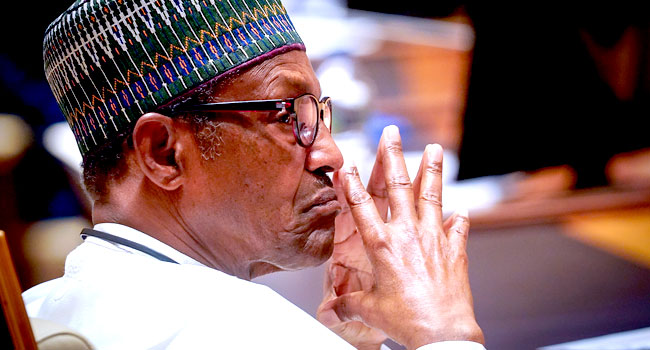N77tr debt, fuel subsidy, 3 other economic issues Tinubu will inherit from Buhari
With barely 3 weeks to the expiration of President Muhammadu Buhari’s administration, Daily Trust analyses key economic issues such as the N77 trillion debt, fuel subsidy removal, among others which will be passed to the new administration to contend with. The administration of President Muhammadu will on May 29 come to an end after […]

President Muhammadu Buhari
With barely 3 weeks to the expiration of President Muhammadu Buhari’s administration, Daily Trust analyses key economic issues such as the N77 trillion debt, fuel subsidy removal, among others which will be passed to the new administration to contend with.
The administration of President Muhammadu will on May 29 come to an end after eight years in power. Although the president has introduced many economic policies which analysts believe have succeeded to a large extent, there are however other economic challenges which will be passed to the incoming administration of Bola Tinubu to resolve.
As it stands, the new administration will inherit a national debt stock of N77 trillion, fuel subsidy removal, naira redesign, unemployment, and national census among others.
Petrol subsidy removal
Petrol subsidy removal has been one of the burning issues in Nigeria today as preceding governments found it difficult to address.
The Buhari government was unable to remove it after taking over from the Jonathan administration which, also tried unsuccessfully to end the subsidy.
With the enactment of the Petroleum Industry Act (PIA) 2022, the Nigerian government came to terms with the reality of subsidy removal owing to the huge amount of money it gobbles up.
Compelled by the implementation of PIA and the overwhelming cost of petrol subsidy, the government suspended removal until June this year.
As part of an effort to resolve the impact of subsidy removal on ordinary Nigerians, the government secured $800 million from the World Bank to be distributed as a palliative to 10 million households.
However, the minister of Finance, Budget and National Planning, Zainab Ahmed, has now backtracked, adding that it will give time for sub-nationals to make inputs.
The new development has transferred the decision of fuel subsidy removal to the incoming federal government.
Population census
Recently, President Muhammadu Buhari approved the postponement of the 2023 census, earlier scheduled for May 3-7, 2023, to a date to be determined by the incoming administration.
The Minister of Information and Culture, Alhaji Lai Mohammed, in a statement, said the president gave the approval after meeting with some members of the Federal Executive Council and the chairman of the National Population Commission and his team in Abuja.
Mohammed stated that in arriving at the decision to postpone the census, the meeting reiterated the critical need for the conduct of a population and housing census, 17 years after the last census, to collect up-to-date data that would drive the developmental goals of the country and improve the living standard of the people.
The NPC, charged with the responsibility of conducting the census, had also admitted that the commission was yet to get all the devices needed to carry out the exercise, noting that some devices would be procured in a few days.
As it stands, it is the new president that will determine when census will be conducted.
The last time a national census was conducted in Nigeria was in 2006 which pegged country’s population at 180 million.
However, according to the State of World Population Report, by the United Nations, Nigeria’s population is estimated to rise to 223.8 million by mid-2023 from 216 million in 2022.
77 trillion debt
Nigeria’s public debt stock, which includes external and domestic debts, was N46.25 trillion in Q4 2022, and increased from N44.06 trillion in Q3 2022, the Nigeria Bureau of Statistics (NBS) in its quarterly report titled “Nigerian Domestic & Foreign Debt Q4 2022 said.
However, the National Assembly has now approved the securitisation of N22 trillion ways and means borrowing from the Central Bank.
The 2023 budget has also been premised on a deficit of about N10 trillion which will eventually skyrocket debt stock to about N77 trillion when the new administration comes on board.
The federal government also recently secured an N366 billion facility from the World Bank to cushion the effect of subsidy removal, which has now been suspended.
The worrisome growing loan facility, which is almost becoming unserviceable, is one major issue that would stare the next government in the face as recent reports have shown that Nigeria used almost 90 per cent of its revenue to service debts.
Naira redesign
In October 2022, the CBN announced the redesign of some denominations of the naira.
The apex bank redesigned the N200, N500 and N1000 notes, a situation that brought about so much hardship in Nigeria.
Before the 2023 presidential election, the CBN had announced the redesign of some denominations of the naira.
During his campaign, the then presidential candidate of the All Progressives Congress, Bola Tinubu, had accused some elements in the corridors of power of using the naira redesign and fuel scarcity to frustrate his presidential ambition.
Despite the release of cash, the effect of the policy lingers in the country. It is left to be seen how the incoming Tinubu government would validate the December 31st deadline set by the Supreme Court or outrightly cancel the policy.
Unemployment
The National Bureau of Statistics puts Nigeria’s unemployment rate 33 per cent.
However, KPMG stated that Nigeria’s unemployment rate increased to 37.7per cent in 2022 and will further rise to 40.6 per cent, due to the continuing inflow of job seekers into the job market.
Although the current administration introduced different skill empowerment programmes, like the N-Power, Graduate Entrepreneurship Empowerment Programme among others, the huge impact it is expected to have on the economy has not yielded much fruit.
As such, the new government may have to devise veritable employment in the short and mid-term for its teeming population to reduce poverty and social vices.
